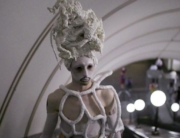
Edward I. Koch, as seen in KOCH (Zeitgeist Films)
Koch breezily looks back at the rise of New York City’s three-term 1980’s mayor, with insider views of the political and economic crises he pulled the city through and the ones that finally brought him down, while following him in the last, busy years of his life. In addition to serving as a reminder for those, like myself, who lived and worked in city government at the time, this documentary is an enjoyable but not very revelatory tribute that has also become a visual obituary. He died the day it opened in the city.
More a political than a personal biography, reporter-turned-director Neil Barsky follows the ever gregarious then 87-year-old Ed Koch around the city to show how people still recognize him and respond fondly to his trademark “How ’m I doin’?” His early claim-to-fame in Greenwich Village politics, including knocking off a longtime political boss to become a four-term congressman in 1968, is familiar. Barsky, though, downplays Koch’s liberal stance, making his reinvention as a law-and-order mayoral candidate in 1977 seem less of the head-spinner than it was. Instead, the director more dramatically focuses on the general election against Liberal Party candidate Mario Cuomo, so bitter a contest that it became a continuing family feud (you can’t make this up in fiction), as first Mario was elected governor in 1983, and then his son Andrew followed suit in 2011.
Through eyewitness history, and lots of TV news and period video clips, Koch is seen pulling the city out of its near-bankruptcy and social and economic doldrums into revival, sometimes through dint of his challenging personality, such as his proud telling of how he spontaneously decided to greet commuters trudging across the Brooklyn Bridge during the rancorous transit strike in 1980. That became a symbol of Koch standing up to the unions. The many loyal staffers interviewed (some a bit deceptively identified as “journalists” based on their later activities) are balanced out with a few who had policy grievances, including Rev. Calvin Butts of the Abyssinian Baptist Church, in regards to the broken promises towards Harlem and the African-American community. Yet even he grudgingly admires him.
Koch was mayor as AIDS became a public health crisis, and gay rights activists ratcheted up protests against the city’s inactions while charges flew about the bachelor mayor’s sexual orientation. Barsky goes in depth with political consultants on how Bess Myerson, beloved in the city as the first New York, and first Jewish, Miss America, was used in campaigns to deflect the issue. In direct questioning, Koch evenly insists on his privacy, but at nearly 90, he just sounds typical of a generation that wasn’t open. With little exploration about his youth and education, more of his personal life is seen now at family seders and in affectionate moments with nieces and nephews.
Barsky usefully notes Koch’s key meeting with Brooklyn political boss Meade Esposito to get his endorsement for his first mayoral campaign. But he loses the context of how party leaders were also embedded into government. For 90 years, before the Supreme Court declared it unconstitutional in 1989, the city was actually run by a unique Board of Estimate of borough and citywide elected officials, which voted on all city contracts and budgets. During Koch’s terms, two county Democratic bosses even wore double hats there as borough presidents. While the newspapers ignored investigating these interlocking connections in the outer boroughs, his virtual hand over of the parking tickets collection agency to patronage and kickbacks became the target of ambitious prosecutor Rudy Giuliani. The stream of indictments and scandals helped doom Koch’s fourth run for election, though his personal integrity wasn’t in question. He’s shown actively lobbying the public for good government, but it’s not clear that he was campaigning for redistricting lines drawn independent of the state legislature.
Many of the interviewees cite achievements that Koch is uncharacteristically modest about—expanding the meritocracy and civil service management (which involved my husband in the Department of Housing Preservation and Development). His administration is also praised for accomplishing unparalleled multibillion dollar housing and urban renewal, including acceding to The New York Times’ demand for Times Square redevelopment.
The renaming of the Queensboro Bridge in 2010 for him seemed like an odd honor, as such recognition is usually only accorded the deceased and Koch had no connection to the bridge or notable association with Queens. But Barsky portrays the ceremony as a sweet valedictory gift from Mayor Michael Bloomberg, one that is appreciatively received by hizzoner, who was pleased to receive, and even select, his posthumous epigraphs in advance, including his participation in this film.






Leave A Comment